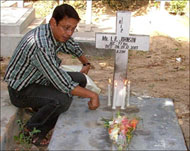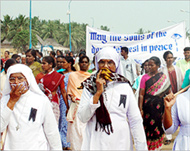Delhi Christians in a grave crisis
Making the leap from burying the dead in cemeteries to using crematoria instead will be a difficult pill to swallow for Delhi’s 200,000 Christians.

But that is exactly what they are being asked to consider as burial space becomes increasingly scarce.
The situation has become so dire that one of the city’s five Christian graveyards in New Delhi‘s Pahar Ganj area resorted to a House Full notice, along with instructions on regulation of traffic to a relatively new and more spacious cemetery at Burari in north Delhi.
“Land for the Burari cemetery was given to us 10 years ago,” says Arnold James, member of the Delhi Minorities’ Commission (DMC), an official watchdog body for religious minorities.
“No fresh space has been allocated for graveyards since then, but when there is shortage of space for the living, how can we ask the government to give us land for the dead?”
It is James who raised the idea of cremation in an exclusive crematorium for the community although he is aware of the “weight of Christian tradition and sentiment” against it.
Not to be given a burial, he said, was considered to be a great tragedy and dishonour in view of parables from the Bible.
|
“A prophet disobeyed God by eating a meal in a forbidden location. God laid a curse on him, that his body would not be buried in the tomb of his fathers. Shortly after, the prophet was attacked by a lion and his remains left on the road” 1 Kings 13:22 |
References to cremation in the Bible, when not specific to martyrdom, connote punishment for criminal acts or improper behaviour and killings by pagans.
It is such references that are some of the reasons cited by the church, especially the Roman Catholic Church, in opposition to the ritual.
Experimenting with cremation
According to American author James Fraser in an essay, Cremation: Is it Christian? (1965), the Roman Catholic Church condemned cremation to the extent “that the only German Catholics excommunicated during the second world war were those who favoured cremation, not those who were prison guards at extermination camps or other mass murderers”.
The first Christian cremation is reported to have taken place in America in 1876, according to an article in Christianity Today. The incident was so awkward that it included readings from Charles Darwin and Hindu scriptures, which record some of the oldest cremation rites and rituals practised in human history.
Since the early 1960s, however, when only 5% of Americans chose cremation, the trend has changed. More families are opting for cremation; a 1995 USA Today article indicated that in some states, cremation as a form of burial had reached nearly 50%.
The trend is catching up in India as well, especially in the north, where Christianity owes its lineage to British Imperial Rule, and, therefore, to the liberal Anglican Church.
Wholly justified
Father Monodeep Daniel of the Church of St James supports the idea of cremation.
|
“If I give away all I have, and if I deliver my body to be burned, but have not love, I gain nothing.” Corinthians 1 13:3 |
“The shift from burial to cremation is wholly justified,” he said.
He also sought the commission’s intervention “for a timely installation of an alternative” which, he added, “will be a great service to Delhi‘s Christian community”.
The pastor quoted Corinthians 1 13:3 and Jonah 1:12 to support cremation.
|
“Take me up and throw me into the sea: then, the (tempestuous) sea will quiet down for you” Jonah 1:12 |
There are others who endorse the idea, but not as directly: “The issue of cremation presents a big dilemma before Christians and the Church has to take a consensus-based decision on this sooner than later,” said Reverend Karam Masih of the Church of North India (CNI).
While evading a direct reply to a question on cremation, Masih cited the example of a “senior pastor of our church, Reverend JH Paul, who was recently cremated”.
“I am told that he wrote it in his will that he wished to be cremated,”
Urban space crunch
The CNI spokesman said he was as concerned about the urban space crunch catching up with the dead as about Christians having to “re-dig graves”. DMC’s James shares the concern about re-use of graves and says it was this that drove him to a campaign for cremation:
“At funerals, relatives often complain to me about having to dig up old graves belonging to other people to bury their dead. This, they feel, takes away the dignity we owe to the dead and also leads to confusion among those coming to pay homage in later years,” he said.
 |
|
Some fear graves may be dug up |
Darryl and Lorraine Johnson, a Catholic couple at New Delhi‘s congested Pahar Ganj cemetery, who had come to pay homage to Darryl’s father on the second anniversary of his death, confirmed the view.
“My father was buried in a fresh piece of land, but now there is so much shortage of space that I feel insecure about his grave; who knows when they will dig it up for re-use?” Johnson told Aljazeera.net.
For practical reasons too the couple would prefer the burial of ashes rather than that of the body. “The 18x18in box rather than the six by eight feet casket will give space to many more people for a much longer period,” said Darryl.
Raising awareness
However, not all Christians are fully aware of the spatial constraints.
Spokesman for the Methodist Church Of India, NC George wrote a letter to James on behalf of the bishop, urging the DMC to “raise awareness, both among pastors and congregations” before implementing the idea.
James has responded to the suggestion with missionary zeal, and next plans to conduct an opinion poll through a visitors’ book question at all five cemeteries in the Indian capital. The majority, he is confident, will choose cremation, “for practical reasons and because it is optional”.
 |
|
Delhi’s 200,000 Christians may |
People resist a new idea when it is thrust on them, and his campaign, says James, is to enable people to make an “informed choice”. The option for burial will always be there, he added. About 1% of Delhi‘s majority Protestant Christians, he said, was already cremating its dead by choice.
The exclusive crematorium he proposes for the community will be inside Delhi‘s John Nicholson Cemetery, the oldest burial site named after a British General during imperial rule in India.
The cemetery largely has graves of British rulers and soldiers, some dating back to the early 19th century. While many British families still bring the ashes of their descendants to the Nicholson Cemetery, others have shifted the graves to their native land.
“I recently dug out the remains of a British soldier buried here in 1850,” said Peter, a new convert to the faith. Peter was struck by the fact that “250 grams of bones was all that remained of the body” and yet, he would like to be buried instead of being “burnt out of memory”.
“I like the idea of somebody someday sitting by my grave and wondering who I was; in cremation one disappears without leaving any trace and that is not a good feeling.”
Scriptural
Conservative Christians, especially of the Kerala-based Orthodox Church, who form less than 2% of Delhi‘s Christian population, share Peter’s sentiments about burial, but for different reasons.
For them, anything that smacks of a compromise with the scriptures is unthinkable, and a Delhi-based church representative, Bishop Job Mar Philoxenos, wrote a strong letter to James saying:
“Our doctrines totally reject the idea of cremation. We pay reverence to the departed ones and their mortal bones in the belief that on the Day of the Judgment the souls join with the bones and appear before the seat of Judgment as a resurrected body.”
|
“God laid a similar curse on Jehoiakim because of his pride and disobedience. Jeremiah said that he would be given the burial of a donkey, to be dragged away and thrown outside the city gates”
Jeremiah 22:19 |
Philoxenos said he was aware of the different views of other denominations, but would like to stick to the rites and rituals of the first century Christians.
Common and family vaults, a practice followed in the parishes of Kerala that have space shortages, is an alternative he suggested. James, however, believes individual boxes with ashes inside and the name of the dead engraved on top to be a “more dignified” option than common vaults.
The issue, as Philoxenos views it, also has political undertones. “Shortage of burial space is a problem for Muslims as well. Can the Minorities’ Commission bring Muslims to the table for a discussion on this?” he asked in response to James’ proposal.
James maintains the idea of cremation is “not to compete with Muslims or to quarrel with the government, but to find a solution to the problem of shortage of burial ground”.
His campaign continues as does the controversy generated by it. As with all things scriptural, controversy over whether cremation violates the fundamentals of religion will remain alive – long after the city’s Christians have buried or cremated their dead.